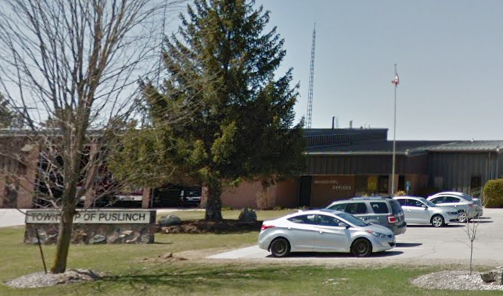ABERFOYLE – Puslinch councillors were set to pass the 2020 budget on Jan. 22.
For the average homeowner, the budget means a local tax increase of 3.72% ($36.90) and a blended increase of 1.52% ($85.26), including county and education portions.
At a public information night on Jan. 16, finance director Mary Hasan explained the details of the proposed budget to an audience of one resident.
Mayor James Seeley noted council’s decision on the budget will be made on Jan. 22.
Hasan stressed the budget process does not end with its adoption, as a budget is based on the best estimates of revenues and expenditures for the year.
“Costs change and new projects may arise when better information is available,” she added.
Hasan noted that in Puslinch, the township receives 18% of the total residential tax bill, while 66% goes to Wellington County and the remaining 16% is divided among local school boards.
The township tax levy, the total amount to be raised through taxes is up 8.4% this year ($3,974,776 in 2019 versus $4,309,110 in 2020).
Hasan explained 67% of the levy funds the operating budget.
The increase in the township’s proposed capital tax levy will fund requirements for current infrastructure as noted in the 2019 asset management plan recommendation.
Hasan said assessment growth is also factored in when determining the impact to local properties and property classes to ensure that the tax levy change is reasonable.
She added both the township and county tax rates are considered preliminary until the county tax policy is adopted by county council.
The county’s proposed budget is scheduled to be approved on Jan. 30. Hasan added education tax rates will be finalized through Ontario regulations at a future date.
Residential increase
Hasan explained the proposed budget results in a township tax increase of 3.72% ($36) with a blended tax increase of 1.52% ($85) based on the median/typical single family home valued at $608,000 in 2020 ($593,250 in 2019).
Farmland increase
Hasan noted a lot of the changes to individual property taxes are being driven by MPAC assessment changes.
She said the proposed budget results in a township tax increase of 12.43% ($40) with a blended tax increase of 10.04% ($186) on the median/typical farmland property assessed at $873,700 in 2020 ($786,475 in 2019).
Commercial increase
Local commercial taxes will increase by 6.81% ($102) and blended taxes by 3.6% ($462) on the median/typical small retail commercial property assessed at $636,100 in 2020 ($602,708 in 2019).
Industrial increase
Local industrial taxes are expected to rise 8.39% ($517.93) with a blended tax increase of 5.67% ($2,770.72) on the median/typical industrial property assessed at $1,649,000 in 2020 ($1,539,750 in 2019).
The following represent some of the capital costs for the coming year:
Public Works
– Watson Road South, from Wellington Road 34 to McRae Station Road, $748,779;
– Moyer’s Bridge $632,500;
– Concession 1, from Sideroad 20 South to Concession 7, $467,895;
– McLean Road/Concession 7 $406,250’
– dump truck replacement $155,000;
– Kerr Crescent stormwater management facility $150,000;
– backhoe replacement $137,000;
– gravel roads improvements reserve $114,300;
– Brock Road sidewalk $78,000;
– new sidewalk, northeast side of Old Brock Road, $60,000; and
– traffic count study $25,000.
Corporate
– asset management reserve, $1,208,766;
– software system enhancements or replacement $100,000;
– marketing and branding implementation, Phase 2, $55,000; and
– computer equipment and unsupported Windows upgrade $10,532.
Fire and Rescue Services
– Rescue 35 truck replacement $520,000;
– self contained breathing apparatus masks and cylinders $162,550;
– power hydraulic toolset (extrication equipment) $52,500;
– heavy vehicle stabilization kit $10,700; and
– structural firefighter gear $9,063.
Parks
– Puslinch Community Centre Park, back soccer fields, $228,295;
– replacement of fencing backstop at Old Morriston ball park $3,668; and
– replacement of benches at Morriston Meadows $3,000.
Asset Management Discretionary Reserve
The 2019 Asset Management Plan recommended the township maintain a minimum target balance of $2 million and a maximum target balance of $4 million in its Asset Management Discretionary Reserve.
Council has authorized a greater contribution to the Asset Management Discretionary Reserve in order to implement the funding requirements for current infrastructure as noted in the 2019 Asset Management Plan.
Council also established a policy to allocate all budget surpluses to the Asset Management Discretionary Reserve for the purpose of meeting future asset management obligations.
Questions
Kathy White asked about discretionary funds.
Hasan explained in the past the township had separate reserve funds for each department.
These are now consolidated into a single asset management reserve, as recommended in the township’s 2019 asset management plan.
Hasan explained the asset management plan looks at funding requirements for the entire township – not just specific departments.
White was curious about the township’s approach for animal control services.
The township is now contracting services through the Cambridge Humane Society.
White said animal control remains a concern to her.
“I think what you have right now is dog catching services, rather than a comprehensive approach for wild animals or dealing with rabies. I think it is time for Puslinch to look at the services of the humane society.”
White asked who residents need to call if the township is not engaging the humane society for this purpose.
Seeley suggested questions of that type would be appropriate for budget discussions for next year.
Hasan said the township went through a request for proposals in 2019 and the Cambridge Humane Society offered the best price.
She noted the township had explored the idea of a more comprehensive service but the cost difference was significant.
White remained concerned as to what will happen when rabid animals are viewed.
Seeley said if the animal appears rabid the OPP will come out and dispose of it, but if the animal is merely being a nuisance, they basicially want residents to deal with it through private means.
“I do understand your concerns though,” said Seeley.




